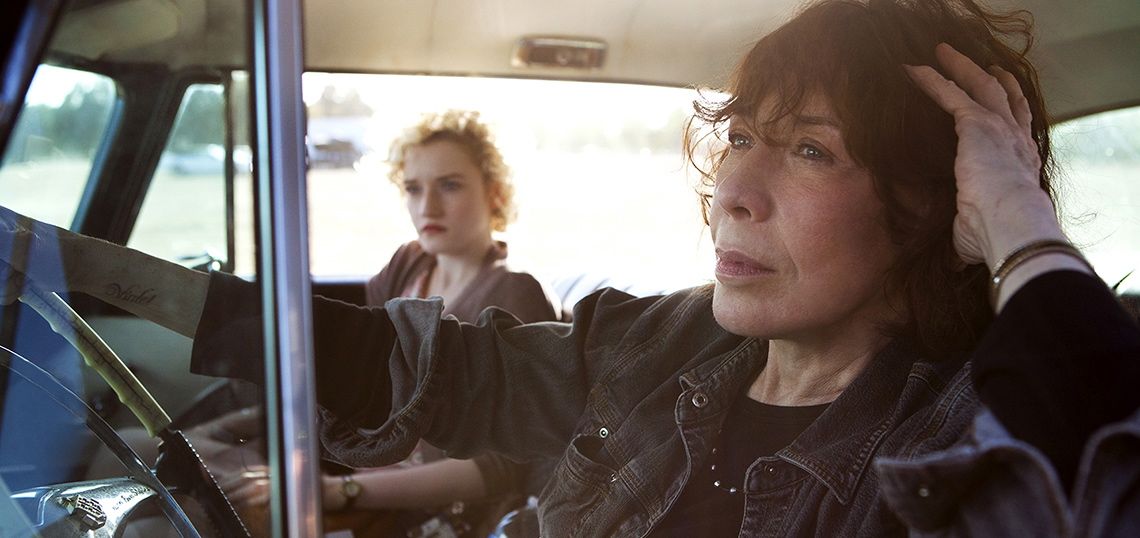
Grandma is a curious, small film that may escape notice – or worse, be gravely misconstrued considering its inherently politicised subject matter- in the context of an overloaded Festival program or slew of American indie films that will grace cinemas this year, but is a nice effort that will reward some viewers. Occasionally drawn in broad sketches especially noticeable in its meagre runtime of 70-odd minutes, it’s still a mostly enjoyable film that hangs on a defining Lily Tomlin performance. Drawing from some auto-biographical elements, Tomlin delivers a turn that expresses some deep anger and emotion alongside her delivery of some truly funny material (in some of the few instances where it makes sense that this was written and directed by American Pie helmer Paul Weitz), a giant performance without which the film would evaporate into mist.
Tomlin stars as Elle, a poet and occasional lecturer, living in a rarefied air and culture where the term “writer-in-residence” can be used as a stinging insult, as it is in a later scene in this film. Disconnected from her daughter, and breaking up with a younger girlfriend (Judy Greer), a failed experiment after the death of her partner of three decades, she’s a particularly fiery character. Visited by granddaughter Sage (Julie Garner) who needs money for an abortion and being in a particularly poor financial state herself, she goes with Sage on a relatively contained road-trip around the town looking to get the money for the appointment that afternoon. The set-up is flimsy, and the character dressing a bit overloaded (her treasured possessions are first-run copies of feminist literature) and on paper Elle seems like what hacky mainstream media would imagine a lesbian academic to be, but Tomlin’s Elle becomes a broader portrait of someone with mistakes and regrets, as she meets people who have been affected by her life in different ways, and coming to terms with the costs of her own pride and self-mythologisation.
Functioning as a selection of vignettes (even separated by title cards), for the most part each chapter is effective; Tomlin’s nastiness can sometimes feels strained – though this aspect of performance is a valid reading of her character – and remains a likeable protagonist even in her moments where she can be an “asshole”, as she loves to advertise. But best is when she has to deal with the revelations of others – the film hinges on the fulcrum of an extended conversation with a man from her past (Sam Elliott) who clearly has the means, if not the inclination, to help her out financially, where Elle’s own feelings and inability to express them becomes most apparent. As we piece together her family history from different scenes and lines of dialogue, the script becomes quite an interesting creature, of a life that played out as it had to, but not without its casualties.
The film also has little interest in tackling the big issues, and its sensitivity especially around the subject of abortion is refreshing. Sage enters the film as a character that has come to the decision to terminate a pregnancy, and neither the film nor the other characters have the arrogance or presumptions to challenge that decision or ‘weigh up the options’, and it’s not an aspect of either character that is played for drama or pathos – the film’s plot involves getting an abortion, but it’s not about abortion, even if the filmmakers’ “stance” is easy to discern. Nor is the film about same-sex couples having children. It’s a film about character, of mothers and daughters and their daughters, and by the end, of Tomlin’s character reflecting on a life lived, and an empathy in her relationship with Sage that can only come from a lifetime of experience. The film isn’t always subtle, and some scenes play out predictably (although Elle’s penchant for saying genuinely funny, offensive things at any moment does keep the script fresh), but it’s a worthwhile film, and a truly memorable central performance.
